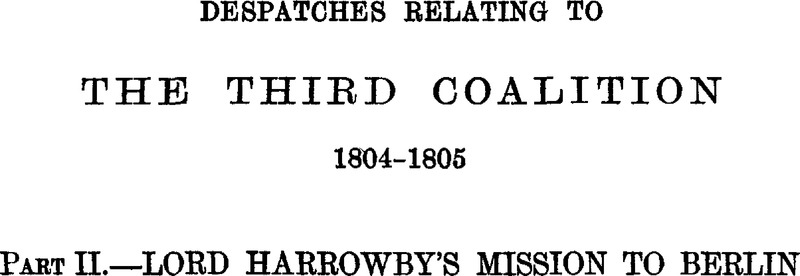No CrossRef data available.
Article contents
Part II. Lord Harrowby's Mission to Berlin
Published online by Cambridge University Press: 24 December 2009
Abstract

- Type
- Despatches Relating to The Third Coalition, 1804–1805
- Information
- Copyright
- Copyright © Royal Historical Society 1904
References
page 208 note 1 Mr. (afterwards Sir) George Jackson (1785–1861) was British chargé d'affaires at Berlin during the temporary absence of his brother, Mr. Francis Jackson.
page 208 note 2 Prussian minister in London.
page 210 note 1 The demarcation line by which, on May 17, 1795, Prussia answered for the neutrality of the North and Central German States, had as its southern bounds the course of the River Neckar, and a line drawn from Wimpfen to Nördlingen, and thence to the Bohemian frontier.
page 212 note 1 The details here given show that Hardenberg was wrong in stating (Denkwürdigkeiten, vol. ii. p. 353) that Harrowby officially offered Holland to Prussia.
page 212 note 2 This was actually done on December 26, 1805, by the Franco-Austrian treaty of Pressburg.
page 213 note 1 The Novarese district, west of the River Ticino, lost by the Habsburgs in 1735.
page 214 note 1 This sentence is of interest as showing how completely Pitt's former fears of Russia's policy in the Eastern Question had been overborne by the new and far greater danger arising from Napoleon's aggressions.
page 215 note 1 British minister at Copenhagen.
page 216 note 1 The Russian general commanding in North Germany.
page 217 note 1 The Anglo-Russian treaty, printed at the close of this volume.
page 218 note 1 It did so to General Baird in January 1806.
page 218 note 2 I.e. by the Demarcationslinie of May 17, 1795 (see supra, p. 210).
page 220 note 1 This was Mr. J. Jackson, the British ambassador, who had returned to Berlin. His brother George, the chargé d'affaires, was then in England. (Diaries of Sir G. Jackson, vol. i. p. 362.)
page 220 note 2 The treaty, or convention, of Potsdam between Russia and Prussia (Nov. 3, 1805). For the text see Martens, vol. ii. p. 481; also Hardenberg, , Denkwürdigkeiten, vol. ii. pp. 324–332Google Scholar. Dr.Ulmann, H., Russisch-preussische Politik (Leipzig, 1899)Google Scholar, has described the negotiations that led up to it. See its terms compared with those of the Anglo-Russian treaty of April 11,1805, in Dr. Hansing's, Hardenberg und die dritte Coalition (Berlin, 1899)Google Scholar, ad fin.
page 220 note 3 Count Metternich. See his Memoirs, vol. i. ch. iii., for his action in this affair.
page 223 note 1 The treaty, or convention, of Potsdam (Nov. 3, 1805).
page 223 note 2 It merely specified that the Emperor Alexander would recognise Napoleon's Imperial title ‘ à la conclusion de la paix générale.’ Article II., dealing with the terms of peace, only used the phrase ‘ le retour de la paix.’
page 224 note 1 I.e. by France (the terms described above).
page 224 note 2 See note 2, p. 223.
page 225 note 1 Prussian troops had already occupied a large part of Hanover, thus covering the Russo-Swedish forces previously landed; the allies were at present some 30,000 strong.
page 225 note 2 This British force, with part of the King's German legion, landed at Cuxhaven on November 19–20, 1805. See C. von Ompteda, Memoirs, p. 184 (Engl. edit.).
page 225 note 3 It stipulated that Prussia must acquire ‘ une frontière plus sûre;’ but its meaning (the acquisition of Hanover) was explained in the first of the secret articles, which were kept from the knowledge of Harrowby and Jackson.
page 228 note 1 The King of Sweden had sent back to the King of Prussia his Order of the Black Eagle. See his letter of April 22, 1805, in Paget Papers, vol. ii. p. 170. The King now refused to let his troops co-operate with those of Prussia.
page 230 note 1 See the notes on the F.O. despatch No. 3, of November 14, 1805, to Lord Harrowby.
page 231 note 1 See note 3 on p. 225.
page 232 note 1 As to this and Pitt's feelings on hearing the stipulation about Hanover, see Woronzow's, despatch in Czartoryski's Memoirs, vol. ii. ch. ix.Google Scholar
page 235 note 1 The first secret article of the Treaty of Potsdam, stipulating the acquisition of Hanover by Prussia.
page 236 note 1 This may have been the ground on which Hardenberg based his later statement (Denkwürdigkeiten, vol. ii. p. 353) that Harrowby offered Holland to Prussia. So too Czartoryski (Memoirs, vol. ii. ch. xii.).
page 238 note 1 This was the second secret article of the Treaty of Potsdam offering East Frisia and the western parts of Prussia's Westphalian lands to George III. as an indemnity for the transfer of the greater part of Hanover to Prussia.
page 239 note 1 See Metternich's despatches of November 4, 6, 1805, quoted in his Memoirs, vol. ii. pp. 85 et seq. (Engl. edit.).
page 239 note 2 Austrian minister in London.
page 246 note 1 The terms of this Memorandum bear a striking resemblance to those of the agreement arrived at by the allies at Traohenberg on July 12, 1813. It may also be regarded as the first draft of the convention printed below (p. 254).
page 247 note 1 This date is open to question. It is more probably December 10 (or some date after the arrival of news of Austerlitz on December 8).
page 259 note 1 I.e. in the battle of Austerlitz (December 2).
page 262 note 1 Diaries of Sir G. Jackson, pp. 377, 390, &c.
page 262 note 2 Hardenberg, Denkwürdigkeiten, vol. ii. p. 332.




